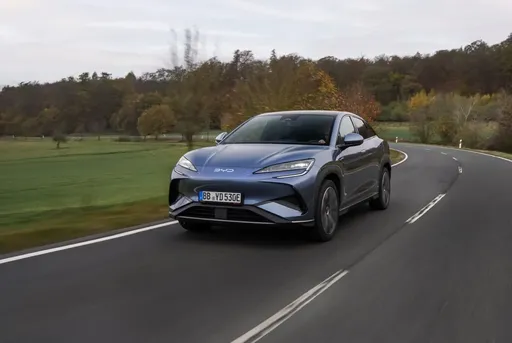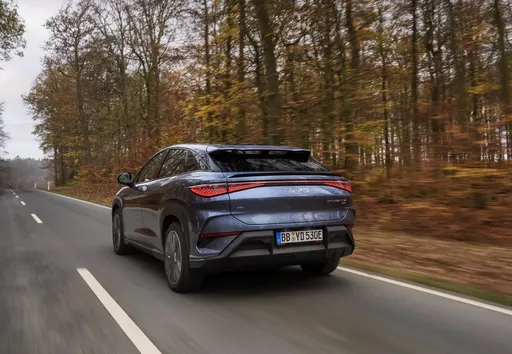Maxus Deliver 9 vs BYD Sealion 7 – Differences & prices compared
Compare performance, boot space, consumption and price in one view.
Find out now: which car is the better choice for you – Maxus Deliver 9 or BYD Sealion 7?
The Maxus Deliver 9 (Cargo Van) comes with a Diesel or Electric engine and Manuel or Automatic transmission. In comparison, the BYD Sealion 7 (SUV) features a Electric engine with Automatic transmission.
When it comes to boot capacity, the Maxus Deliver 9 offers , while the BYD Sealion 7 provides 520 L – depending on how much space you need. If you’re looking for more power, decide whether the 204 HP of the Maxus Deliver 9 or the 530 HP of the BYD Sealion 7 suits your needs better.
In terms of consumption, the values are 26.20 kWh8.80 L per 100 km for the Maxus Deliver 9, and 19.90 kWh for the BYD Sealion 7.
Price-wise, the Maxus Deliver 9 starts at 38700 £, while the BYD Sealion 7 is available from 42800 £. Compare all the details and find out which model fits your lifestyle best!
Maxus Deliver 9
The Maxus Deliver 9 presents itself as a robust and versatile vehicle, perfectly suited for both urban and rural deliveries. With a spacious cargo area and a modern cabin equipped with advanced technology, it caters to the needs of both driver comfort and logistical efficiency. Its sleek design and reliable performance make it an attractive option for businesses looking to upgrade their fleet.
detailsBYD Sealion 7
The Sealion 7 captivates with its striking design and impressive performance that appeals to both enthusiasts and casual drivers alike. With a focus on comfort and advanced technology, this model redefines the driving experience, making every journey enjoyable. Its sleek silhouette coupled with an innovative interior showcases the perfect blend of style and functionality.
details @ BYD
@ BYD
 @ BYD
@ BYD
 @ BYD
@ BYD

|
|
|
|
|
Costs and Consumption |
|
|---|---|
|
Price
38700 - 60200 £
|
Price
42800 - 52300 £
|
|
Consumption L/100km
8.80 L
|
Consumption L/100km
-
|
|
Consumption kWh/100km
26.2 - 30.8 kWh
|
Consumption kWh/100km
19.9 - 21.9 kWh
|
|
Electric Range
287 - 358 km
|
Electric Range
456 - 502 km
|
|
Battery Capacity
-
|
Battery Capacity
-
|
|
co2
0 - 231 g/km
|
co2
0 g/km
|
|
Fuel tank capacity
-
|
Fuel tank capacity
-
|
Dimensions and Body |
|
|---|---|
|
Body Type
Cargo Van
|
Body Type
SUV
|
|
Seats
3 - 7
|
Seats
5
|
|
Doors
4
|
Doors
4
|
|
Curb weight
2360 - 2770 kg
|
Curb weight
2225 - 2435 kg
|
|
Trunk capacity
-
|
Trunk capacity
520 L
|
|
Length
5546 - 5940 mm
|
Length
4830 mm
|
|
Width
2062 mm
|
Width
1925 mm
|
|
Height
2525 - 2755 mm
|
Height
1620 mm
|
|
Payload
730 - 1140 kg
|
Payload
410 kg
|
Engine and Performance |
|
|---|---|
|
Engine Type
Diesel, Electric
|
Engine Type
Electric
|
|
Transmission
Manuel, Automatic
|
Transmission
Automatic
|
|
Transmission Detail
Manual Gearbox, Reduction Gearbox
|
Transmission Detail
Reduction Gearbox
|
|
Drive Type
Front-Wheel Drive
|
Drive Type
Rear-Wheel Drive, All-Wheel Drive
|
|
Power HP
148 - 204 HP
|
Power HP
313 - 530 HP
|
|
Acceleration 0-100km/h
16 - 19 s
|
Acceleration 0-100km/h
4.5 - 6.7 s
|
|
Max Speed
100 - 160 km/h
|
Max Speed
215 km/h
|
|
Torque
330 - 375 Nm
|
Torque
380 - 690 Nm
|
|
Number of Cylinders
4
|
Number of Cylinders
-
|
|
Power kW
108 - 150 kW
|
Power kW
230 - 390 kW
|
|
Engine capacity
1996 cm3
|
Engine capacity
-
|
General |
|
|---|---|
|
Model Year
2022 - 2024
|
Model Year
2024
|
|
CO2 Efficiency Class
G, A
|
CO2 Efficiency Class
A
|
|
Brand
Maxus
|
Brand
BYD
|
Maxus Deliver 9
A Versatile Workhorse: The Maxus Deliver 9
The Maxus Deliver 9 is rapidly gaining traction in the commercial vehicle sector. As a versatile and capable van, it meets the needs of a range of industries, providing both diesel and electric powertrains. The model year updates from 2020 to 2023 bring a host of technical advancements and innovative features that make the Maxus Deliver 9 stand out in its class.
Powertrain Options: Diesel and Electric
The Maxus Deliver 9 offers a choice between traditional diesel and modern electric powertrains. The diesel variant comes with a 2.0-litre engine, delivering 148 PS and a torque of 310 Nm. It is available with both front and rear-wheel drive configurations, coupled with a manual gearbox. These options provide robust and reliable performance for traditionalists who favour a dependable diesel setup.
For those looking to the future, the electric eDeliver 9 offers compelling specifications. With a power output of 204 PS and torque reaching 375 Nm, the electric version provides a silent and efficient drive. Battery capacity options cater to different needs, with ranges spanning from 265 km to an impressive 328 km depending on the chosen battery configuration. This makes the eDeliver 9 a viable choice for urban and regional deliveries.
Innovative Features for Enhanced Utility
The Maxus Deliver 9 is equipped with features designed to enhance practicality and comfort. With a payload capacity ranging from 630 to 1275 kg, it is well-suited for various commercial applications. The model’s dimensions and configurable seating options (accommodating between 3 to 7 passengers) add flexibility, making it ideal for both logistics and passenger transport roles.
Despite its work-focused design, the Deliver 9 doesn’t skimp on creature comforts. The cabin offers a modern infotainment system with touchscreen capabilities, providing intuitive control over navigation and connectivity functions. Advanced safety features, including lane departure warning and adaptive cruise control, are available, ensuring peace of mind for drivers and fleet managers alike.
Environmental and Economic Efficiency
In an era where sustainability is paramount, the Maxus Deliver 9 delivers low operating costs and reduced environmental impact, particularly in its electric form. The electric models boast zero tailpipe emissions and CO2 efficiency class ratings up to A, making them an attractive choice for green-conscious businesses.
From an economic standpoint, the electric variants also offer long-term savings through reduced fuel costs and maintenance requirements compared to their diesel counterparts. Initial pricing for the Deliver 9 ranges from €43,423 to €93,403, depending on the specification and powertrain, representing competitive value within the segment.
Conclusion: Meeting Modern Transport Needs
The Maxus Deliver 9 represents a compelling proposition in the commercial vehicle market. With its blend of diesel and electric powertrains, innovative features, and a focus on efficiency, it meets the diverse needs of modern businesses. Whether prioritising traditional power or embracing new technologies, the Deliver 9 offers a versatile choice that businesses can rely on for both present and future transportation needs.
BYD Sealion 7
The automotive landscape is evolving faster than ever, and one model capturing significant attention is the BYD Sealion 7. This electric SUV not only marries performance with sustainability but also boasts innovations that redefine user expectations. Let’s dive into the technical aspects and standout innovations of this remarkable vehicle.
Powerful Performance and Versatile Configurations
The BYD Sealion 7 comes in several configurations, catering to diverse performance needs. It offers two versions of electric all-wheel drive, producing an impressive 530 horsepower, while the rear-wheel drive variant delivers a solid 313 horsepower. This spectrum of power allows drivers to select an option that aligns with their driving style and requirements.
Acceleration is another noteworthy aspect of the Sealion 7. The rear-wheel drive model achieves 0-100 km/h in just 6.7 seconds, while the all-wheel drive variant does it in a breathtaking 4.5 seconds. This combination ensures that the Sealion 7 doesn’t just compete; it leads in performance within its segment.
Innovative Electric Drive and Efficiency
Equipped with a cutting-edge reduction gearbox, the BYD Sealion 7 not only delivers incredible acceleration but also underscores efficiency with a consumption rate as low as 19.9 kWh per 100 km for the most efficient model. The all-wheel drive variants have slightly higher consumption rates of 21.4 kWh and 21.9 kWh, respectively, but they still perform admirably when it comes to efficiency.
In terms of electric range, the Sealion 7 showcases a commendable performance. Depending on the specific configuration, it offers ranges between 456 and 502 km on a single charge, making it a competitive choice for those concerned about range anxiety typical of electric vehicles.
Sleek Design and Practicality
Beyond performance and efficiency, the BYD Sealion 7 impresses with its aesthetic appeal and practicality. With dimensions of 4830 mm in length, 1925 mm in width, and 1620 mm in height, this SUV is designed for presence. Moreover, the spacious interior comfortably accommodates up to five passengers, enhancing its usability for families and adventure seekers alike.
Practical features like a trunk capacity of 520 liters ensure that the Sealion 7 stands ready for any journey, whether it’s a weekend road trip or daily commuting. Additionally, the vehicle has a payload capacity of up to 410 kg, providing flexibility for carrying cargo without sacrificing comfort.
Safety and Eco-Friendliness
The BYD Sealion 7 also excels in safety and sustainability. It holds a CO2 efficiency class of A, making it an environmentally friendly option with zero emissions during operation. This aligns with the growing consumer demand for greener transportation solutions.
Furthermore, the vehicle is engineered with multiple safety features that ensure a secure driving experience for all occupants, a crucial element that underscores the ongoing commitment by BYD to safety in electric vehicles.
Final Thoughts
As an emblem of electrification in the automotive industry, the BYD Sealion 7 stands out with its combination of powerful performance, innovative technology, and eco-friendly credentials. For those exploring the electric SUV market, this vehicle represents a significant milestone, offering a compelling argument for drivers looking to transition to a more sustainable yet thrilling driving experience.
Which drive types are available for the Maxus Deliver 9?
Available as Front-Wheel Drive.
The prices and data displayed are estimates based on German list prices and may vary by country. This information is not legally binding.
